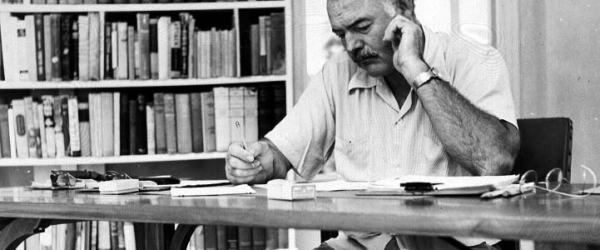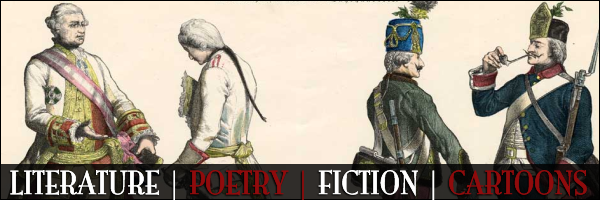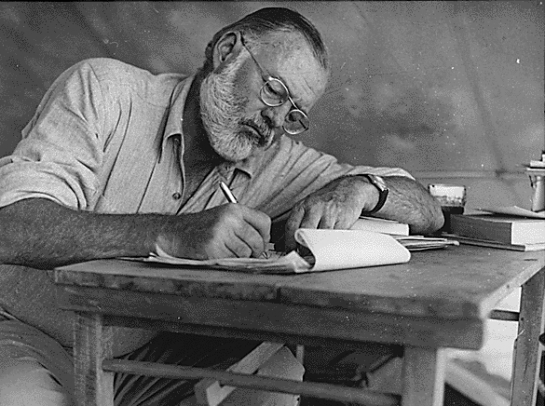
The Fiction Writer’s Guide To Diversity
Essays, LiteratureErnest Hemingway | 1953
Hemingway sits at a table writing while at his campsite in Kenya.
Photograph from The National Archives.
If you’re a writer, and you’re worth your weight in salt, chances are your head is lodged so far up your fundament (read: ass) that you can hardly tell truth from fiction, dreams from desires, redemption from arc or your opinion from that of your character’s. Call it an occupational hazard. As a long time sufferer of such a compromised perspective, I have found a possible cure, and if you haven’t gone to seed, you may be interested in trying it out: Literary Diversity.
Literary forms that can help your fiction writing:
Poetry
Poetry is based almost entirely on rhythm. It doesn’t matter if you are channeling the structured pentameter of Robert Burns or the disjointed staccato of Sapphire – you are controlling the pace of the reader and the rhythm with which they ingest each word. This can be wildly helpful when it comes to writing fiction or articles. You will notice, even if you’re not a poet at heart, that you tend to focus heavily on the flow of words when writing, usually by reading them over and over again to yourself, sometimes adding a comma here, a semicolon there or a line break when needed. Poetry reminds the writer than they are in control of how the reader reads his words.
Stage
When writing for the stage, one otherwise uncommon element is essential to the form: Blocking. Each character’s physical location in the scene becomes crucial. Whose back is to who? How far apart are they? Are they standing near a door that is about to open? These are some questions that when writing a stage-play you must ask yourself, but when writing fiction often get swept under the proverbial rug. But, if you can set the scene physically in your fiction the way you must in theater, you will notice a great improvement in your story’s intelligibility.
Short Stories
If you are accustomed to long form writing, delving into short stories can often be of great service. A short story, usually, is a miniature scene. It’s focused. It’s immediate. And it’s to the point. Each story must have a beginning, a middle and an end and each scene within that story should be structured in the same fashion. If you can master the craft of short stories, each with an arc and punctuated finale, the scenes within your long form piece will be ever stronger for it.
Film
Few forms relay so heavily on formatting as the screenplay. In short, there is dialogue and their is everything else. Generally, if you include ‘it’ in your scene action, heading or direction, and not in your dialogue, the viewer won’t get ‘it’ – because the viewer can’t read the writer’s mind. This trains the writer to tell the story through dialogue instead of relying heavily on easier vehicles such as narration or the voice of God. And, as a screenplay is only as good as its dialogue, it will also teach the writer to differentiate between quality and tripe conversation among characters.
Essays & Articles
Not a first on the list for your average fiction scrawler, but, there is plenty to learn from essays and articles that can aid one’s writing. With most great essays, and some decent articles, the goal is remove the writer from the writing and simply transmit the ‘point’. The writer is invisible. The reason is paramount. If one can master this, and parlay the skill into long form fiction, he will be one step closer to writing like the Greats!
Love Letters
Indispensable for writers and non-writers alike. If you are in love with someone, and have not written him or her a letter telling why or how much, do so. If you are not in love with someone, write a letter to your walk-in closet, your Alpha Romeo, your pet or your coin collection. Anything. Anything you care deeply about. Try writing not with creative emotion, but real emotion. See what it actually looks like in the black letter and next time you sit down in front of that blinking cursor remember what devotion, adoration and love really sounded like.
I started out writing screenplays and after a couple thousand pages of courier I noticed that any progress or forward motion my writing style may of had, had come screeching to a halt. Once aware of your weaknesses as a writer, the pile of crumpled up sheets of paper in the corner of your office seems to be higher than usual. By broadening your literary horizons, there may come a time in the near future when you can once again see the floor boards of that fated corner in your writing salon.
Get out of your comfort zone. Take a night, or a week, or a month and write something different. See what you learn from it. If you didn’t learn a thing, and it was utterly abortive, just put it on a blog and move on. Remember what Jean Paul Richter once said ‘Variety of mere nothings gives more pleasure than uniformity of something’.
Get The Complete Short Stories of Hemingway.
























